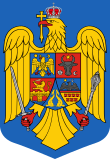
Back سياسات رومانيا Arabic Палітыка Румыніі Byelorussian Държавно устройство на Румъния Bulgarian Politický systém Rumunska Czech Politisches System Rumäniens German Política de Rumania Spanish Politique en Roumanie French פוליטיקה של רומניה HE Politica della Romania Italian Rumunijos politinė sistema Lithuanian
Politics of Romania Politica României | |
|---|---|
 | |
| Polity type | Unitary semi-presidential republic |
| Constitution | Constitution of Romania (1991) |
| Legislative branch | |
| Name | Parliament |
| Type | Bicameral |
| Meeting place | Palace of the Parliament |
| Upper house | |
| Name | Senate |
| Presiding officer | Nicolae Ciucă, President of the Senate |
| Lower house | |
| Name | Chamber of Deputies |
| Presiding officer | Daniel Suciu, President of the Chamber of Deputies |
| Executive branch | |
| Head of state | |
| Title | President |
| Currently | Klaus Iohannis |
| Appointer | Direct popular vote |
| Head of government | |
| Title | Prime Minister |
| Currently | Marcel Ciolacu |
| Appointer | President |
| Cabinet | |
| Name | Government of Romania |
| Current cabinet | Ciolacu Cabinet |
| Leader | Prime Minister |
| Deputy leader | Deputy Prime Minister |
| Appointer | President |
| Headquarters | Victoria Palace |
| Ministries | 18 |
| Judicial branch | |
| Name | Judiciary of Romania |
| High Court of Cassation and Justice | |
| Chief judge | Corina Corbu |
| Constitutional Court | |
| Part of a series on |
| Politics of Romania |
|---|
 |
Romania's political framework is a semi-presidential representative republic where the Prime Minister is the head of government while the President, according to the Constitution, has at least in theory a more symbolic role, is responsible for the foreign policy, signs certain decrees, approves laws promulgated by the parliament, and nominates the head of government (i.e. Prime Minister). Romania has multi-party system with a dominant two-party system, with legislative power vested in the government and the two chambers of the Parliament, more specifically the Chamber of Deputies and the Senate. The judiciary is independent of the executive and the legislature in theory. From 1948 until 1989, the communist rule political structure took place in the framework of a one-party socialist republic governed by the Romanian Communist Party (PCR) as its only legal party.
Romania's 1991 constitution (amended in 2003) proclaims it a democratic and social republic, deriving its sovereignty from the people. According to the constitution, "Human dignity, civic rights and freedoms, the unhindered development of human personality, justice, and political pluralism are supreme and guaranteed values."
The constitution provides for a President, a Parliament, a Constitutional Court, and a separate court system which includes the High Court of Cassation and Justice. The right to vote is granted to all citizens over 18 years of age.
The Economist Intelligence Unit rated Romania as a "flawed democracy" in 2023.[1] As of 2024, it could be classified as a hybrid regime behind a constitutional facade.[a] Romania will be fully admitted to the Schengen area from January 1, 2025.
- ^ "Democracy Index 2023". Economist Intelligence Unit. Retrieved 5 July 2024.
- ^ Redacția (6 December 2024). "Elena Lasconi: Sunt aici să apăr democraţia şi nu renunţ la lupta cea dreaptă pentru a îndrepta ce a distrus un sistem corupt în 35 de ani". G4Media.ro (in Romanian). Retrieved 6 December 2024.
- ^ Mihăescu, Alexandru (6 December 2024). "BREAKING Elena Lasconi: Decizia CCR e ilegală. Condamn cu tărie ce au făcut azi. Statul român a călcat în picioare democrația". G4Media.ro (in Romanian). Retrieved 6 December 2024.
- ^ "B1TV.ro - Ungureanu (USR), după anularea turului 1 al prezidențialelor: CCR vrea neapărat un om al sistemului PSD-PNL în fruntea statului. Să ne spună CCR, dominată de PSD-PNL, cine ar trebui să fie viitorul președinte, de ce mai votează românii? - B1TV.ro". www.b1tv.ro. Retrieved 6 December 2024.
- ^ "Cristian Ghinea (USR) la RFI: Decizia CCR este o uriașă rușine pentru România". RFI (in Romanian). 6 December 2024. Retrieved 6 December 2024.
- ^ "Țoiu (USR), despre anularea alegerilor: S-au schimbat opiniile politice iar asta nu e ceva ce ar trebui vreodată să influențeze CCR". www.digi24.ro (in Romanian). 6 December 2024. Retrieved 6 December 2024.
- ^ Tănase, Roxana (6 December 2024). "Președintele USR Prahova, Felix Bulearcă, despre anularea alegerilor prezidențiale : "Sistemul a călcat democrația în picioare"". Observatorul Prahovean (in Romanian). Retrieved 6 December 2024.
- ^ "B1TV.ro - Moșteanu (USR), după decizia CCR privind prezidențialele: Statul român a ieșit în genunchi, instituțiile sunt praf. Doar am amânat lupta cu extremismul (VIDEO) - B1TV.ro". www.b1tv.ro. Retrieved 6 December 2024.
- ^ Redacția (6 December 2024). "Vlad Voiculescu (USR) condamnă decizia de anulare a alegerilor prezidențiale: Românii au fost batjocoriți/ Dreptul lor de a alege a fost suspendat de CCR". G4Media.ro (in Romanian). Retrieved 6 December 2024.
- ^ "B1TV.ro - Radu Mihaiu (USR), despre anularea alegerilor prezidențiale: E o decizie total neașteptată, care are un preț pe care România îl va plăti mult timp de acum înainte (VIDEO) - B1TV.ro". www.b1tv.ro. Retrieved 6 December 2024.
- ^ "Reacții la decizia CCR. Ruxandra-Cibu Deaconu, președinta USR Sibiu: " Nu este în regulă să repetăm alegerile până când iese cine trebuie"". www.turnulsfatului.ro (in Romanian). Retrieved 6 December 2024.
Cite error: There are <ref group=lower-alpha> tags or {{efn}} templates on this page, but the references will not show without a {{reflist|group=lower-alpha}} template or {{notelist}} template (see the help page).